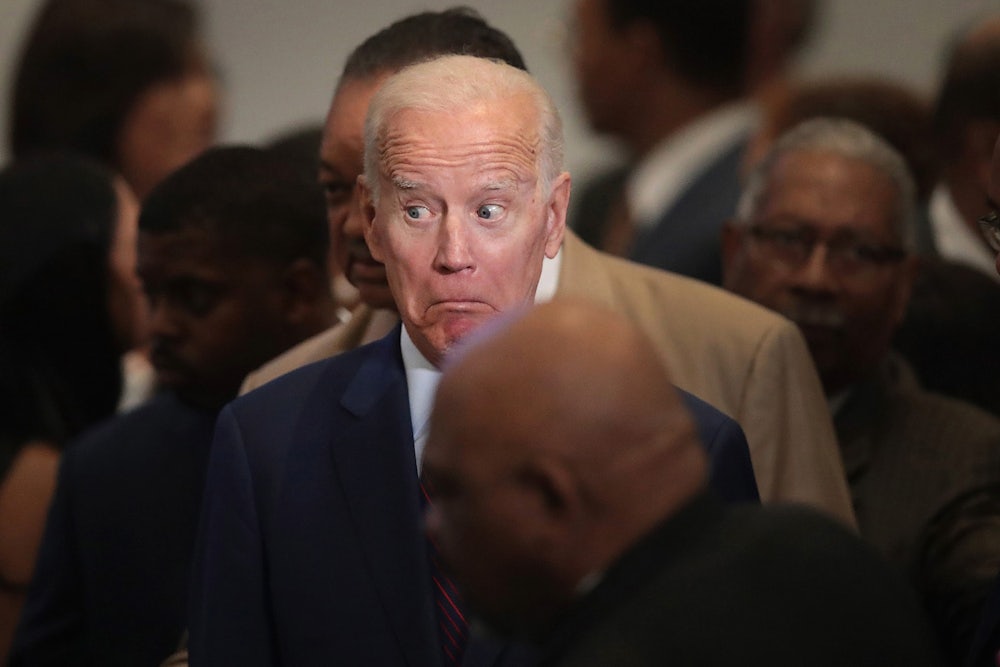On Monday, the Democratic contingent of the New York State Board of Elections decided to scuttle its own presidential primary out of concern, it insisted, for voters who might otherwise be exposed to the coronavirus at the polls. It was a mystifying explanation. New York Governor Andrew Cuomo had, by this time, already promised mail-in absentee ballots for all voters, and state and local primaries were still set to proceed as usual. The real objective of canceling the presidential primary, it would seem, was to ensure that Bernie Sanders would not collect any delegates in the state where he had won 41 percent of the vote, or more than 820,000 votes, in the prior election. “What the Sanders supporters want is essentially a beauty contest that, given the situation with the public health emergency that exists now, seems to be unnecessary and, indeed, frivolous,” board co-chair Douglas Kellner said.
The likening of democracy to an outdated, vaguely embarrassing institution felt very GOP indeed: Republicans apparently no longer have cornered the market on voter suppression. In fact, over the past fortnight, there have been many instances in which the traditional lines of separation between the two parties have merged and blurred. In an election year, this seems like a foolish mistake for Democrats to make; in a crisis year, it feels like a dangerous one.
And yet this has been the past month’s defining political phenomenon. The week before the New York State primary was needlessly canceled, presumptive Democratic nominee Joe Biden, who might now be awarded all of New York’s 320 delegates, released a bewildering ad seemingly designed to appeal to the same people voting in New York’s presidential primary, which is to say, no one at all. Despite no discernible public mandate to punish China for the coronavirus, the ad thundered that Trump had “rolled over for the Chinese” on the pandemic, in part by being too hesitant to clamp down on Chinese travelers to the United States.
Among those understandably repulsed by such rhetoric were a number of Asian Americans, who have emerged in recent years as reliable if undercourted Democratic voters. According to surveys, one reason Asian American voters have increasingly turned away from Republicans is the GOP’s seething xenophobia. Biden, unfathomably, seemed to be making a compelling case for this constituency to simply stay home on Election Day. Ah, well: the better to avoid a raging pandemic and a spike in anti-Asian hate crimes.
Meanwhile, Democrats have also continued an ugly blitz to bury Tara Reade, a former Biden staffer who has accused him of sexual assault. Despite multiple sources who confirmed that Reade had told them about the incident at the time it occurred, Democrats rushed to circle the wagons. “I stand by Vice President Biden. He has devoted his life to supporting women, and he has vehemently denied this allegation,” Senator Kirsten Gillibrand said recently, sounding rather like former Republican Senator Orrin Hatch, who, at the the time of the Brett Kavanaugh hearings, huffed, “Judge Kavanaugh has denied these accusations categorically, the only other potential witness has no recollection of the alleged event, and now 65 women who knew Brett in high school have come forward as witnesses of his strong character.” Stacey Abrams, who’s made little secret of her vice presidential aspirations, also defended Biden on the grounds of his civil service. “I believe Joe Biden. I believe that he is a person who has demonstrated that his love of family, his love of our community, has been made perfectly clear through his work as a congressional leader and as an American leader,” she said.
Then there’s New York Governor Cuomo, now something of a pandemic-time media star, who floated over $10 billion in state budget cuts last Saturday. If implemented, Gothamist’s Ross Barkan noted, those cuts could affect a variety of services from public transportation and education to a health care network already worn thin by the coronavirus. Though the announcement of the cuts appeared to be part of a ploy to secure more federal funding for New York, the state’s fiscal troubles are also a product of Cuomo’s long-running reticence to raise taxes on the rich. “New York’s decision to follow the federal government and not collect state taxes until July will create additional pressure to make up for enormous gaps,” Barkan wrote. A few days later, Cuomo decried the presence of homeless people sleeping in city subway cars and suggested that the solution was a more stringent MTA crackdown. “If they need more police, if they need more social service providers, hire them,” said Cuomo. The hazy threat of increased criminalization, as it happens, has also been the Trump administration’s basic approach to homelessness.
The most puzzling thing about the Democrats’ most recent spell of turning Republican is that GOP policies are more unpopular than they’ve been in a long while, and the president remains largely distrusted by the American public. Why wouldn’t the Democrats take advantage, for instance, of the current enthusiasm for Medicare for All to create a better-functioning health care system both for the current crisis and beyond, rather than dangling a tepid plan to dump yet more money into the hands of private insurers? Perhaps, after all, there’s still one crucial difference between the two parties, captured perfectly by the old aphorism: Republicans fear their base, and Democrats hate theirs.
